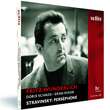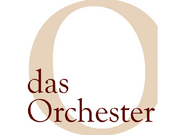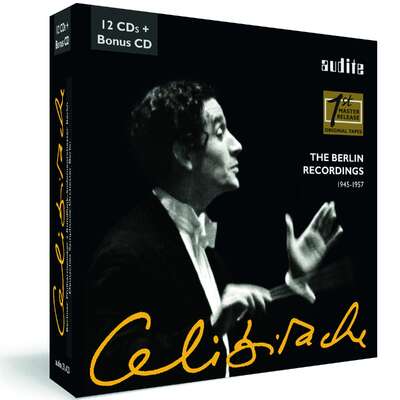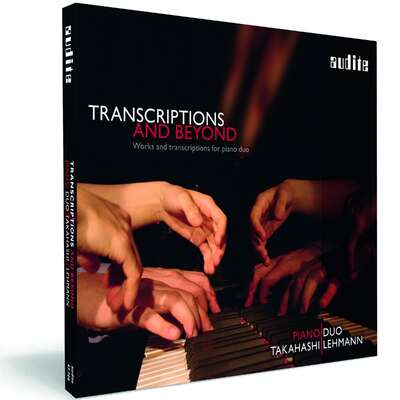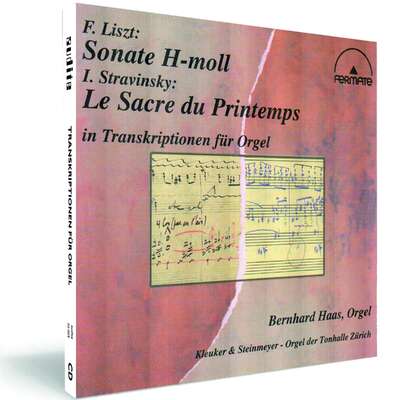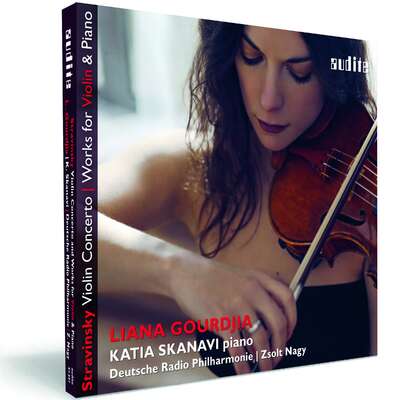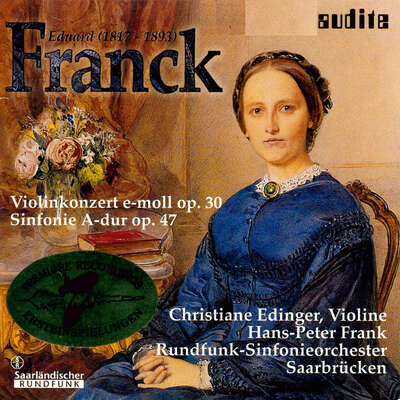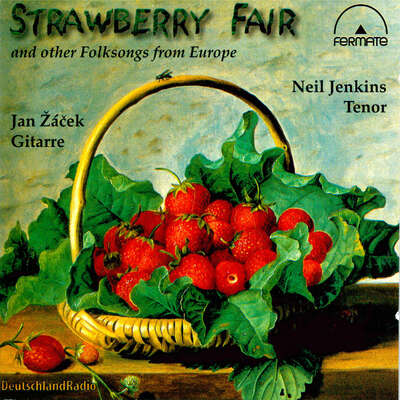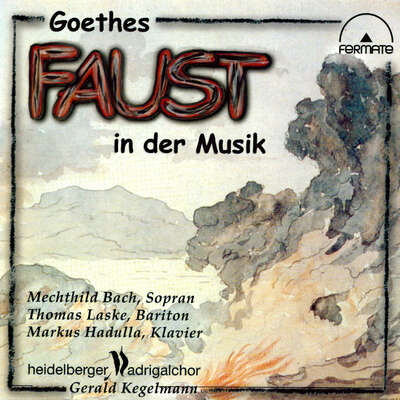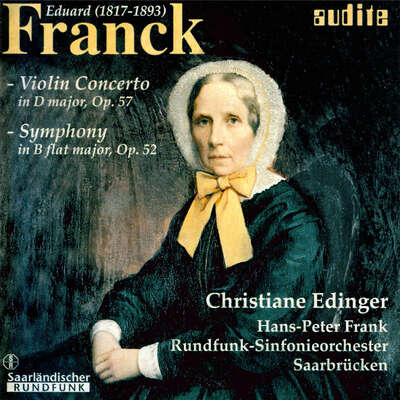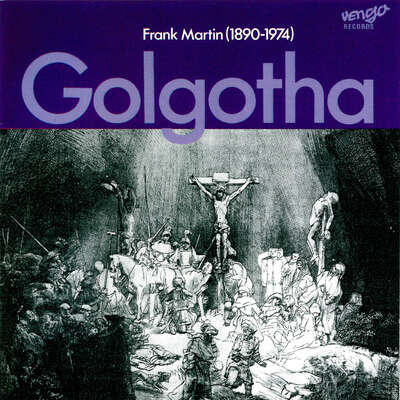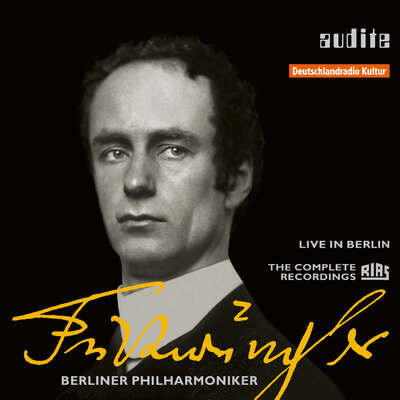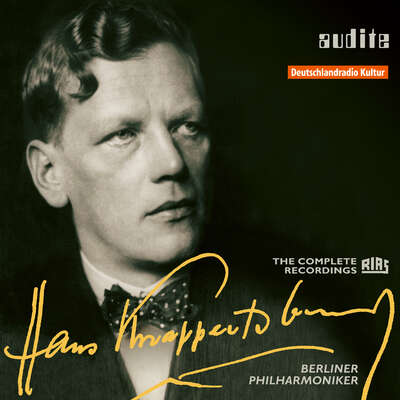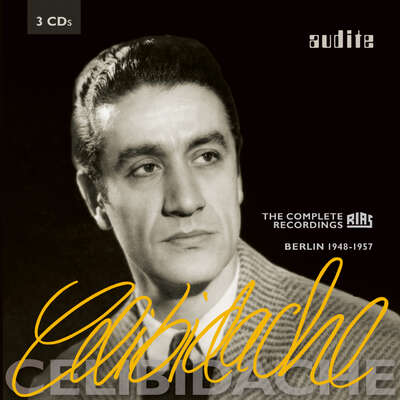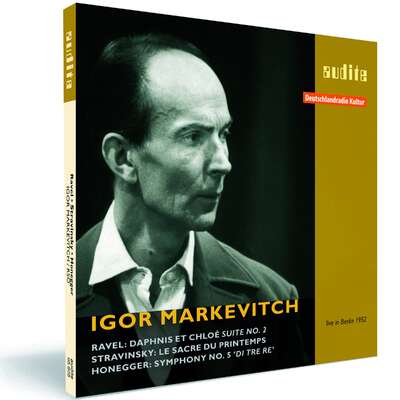
Fritz Wunderlich sings Stravinsky – a rare combination! Not only is the combination of singer and work an unusual one, but the work itself also is – and has always been – a rarely performed part of Stravinsky’s œuvre. The part of Eumolpius – Greek for “he who sings beautifully” –...more
"The release offers a rare opportunity to hear the fondly remembered tenor in unfamiliar repertoire, this performance of Perséphone the only occasion he sang the piece, taking the role of Eumolpius – which, fittingly enough, translates as “he who sings beautifully”." (The Classical Review)
Details
|
Igor Stravinsky: Perséphone
live recording with Fritz Wunderlich from 1960 |
|
| article number: | 95.619 |
|---|---|
| EAN barcode: | 4022143956194 |
| price group: | BCB |
| release date: | 11. March 2011 |
| total time: | 48 min. |
Bonus Material
-
Producer's Comment
First-hand impressions of producer Ludger Böckenhoff [german]
Informationen
Fritz Wunderlich sings Stravinsky – a rare combination! Not only is the combination of singer and work an unusual one, but the work itself also is – and has always been – a rarely performed part of Stravinsky’s œuvre.
The part of Eumolpius – Greek for “he who sings beautifully” – in Igor Stravinsky’s Perséphone could have become Fritz Wunderlich’s “signature role” if he had sung it more than only the one time, in 1960, for the Hessische Rundfunk in Frankfurt am Main. Dean Dixon, who was the first Afro-American to become chief conductor of a German Radio Symphony Orchestra in the following year, had programmed this virtually unknown jewel by Stravinsky. The great German actress Doris Schade took on the speaking part of Persephone.
This lyrical melodrama, based on a text by André Gide, was written during Stravinsky’s neo-classical period, its subject matter being the ancient classical myth of death and re-birth. The rewarding tenor role of the priest Eumolpius presents Fritz Wunderlich at the pinnacle of his art. This live recording of this rarely performed work is a unique document and closes a gap in the discographic legacy of the singer who died so prematurely.
There is a “Producer’s Comment” from producer Ludger Böckenhoff available on audite.de.
The production is part of our series „Legendary Recordings“ and bears the quality feature „1st Master Release“. This term stands for the excellent quality of archival productions at audite. For all historical publications at audite are based, without exception, on the original tapes from broadcasting archives. In general these are the original analogue tapes, which attain an astonishingly high quality, even measured by today‘s standards, with their tape speed of up to 76 cm/sec. The remastering – professionally competent and sensitively applied – also uncovers previously hidden details of the interpretations. Thus, a sound of superior quality results. CD publications based on private recordings from broadcasts or old shellac records cannot be compared with these.
Reviews
The Art Music Lounge
| June 14, 2019 | Lynn René Bayley | June 14, 2019 | source: https://artmusic...
Dixon’s 1960 “Perséphone”
Broadcast a Gem
Whatever other recording you may have of Perséphone in French, this performance is a must-have. It is unique in so many ways.Mehr lesen
Südwest Presse
| Freitag,16. Dezember 2011 | Jürgen Kanold | December 16, 2011
Aufregend schön
Orchestereinspielungen und Kammermusik: Vor Weihnachten noch ein paar klassische Tipps
Die Klassiker, Beethoven vor allem, hat eigentlich jeder schon imMehr lesen
Diapason | N° 597 Decembre 2011 | Patrick Szersnovicz | December 1, 2011 Igor Stravinsky
Nous sommes en concert, le 11 novembre 1960 à la Radio de Francfort (Hessische Rundfunk). Perséphone (1933-1934), seule partition importante deMehr lesen
L’absence du texte original de ce mélodrame, avec ses rimes riches et ses trouvailles, ne va pas jusqu'à dévoyer le sens profond de cette réconciliation sereine de l'homme et de la nature, de ce retour au sacrifice du Sacre, transplanté sous les cieux helléniques. Peut-être même la traduction allemande permet-elle à l'auditeur français de mieux se concentrer sur ce qui fait l'essentiel de Perséphone: sa musique, réputée à tort ennuyeuse, sa couleur blanche, nacrée, ses innombrables dégradés de gris, ses lignes vocales faussement archaïsantes.
La direction du chef noir américain Dean Dixon, souple mais solidement architecturée, met en valeur le rôle essentiel et singulier du timbre, autant que les moments les plus marquants, rares mais savoureux, sur le plan et dramatique. Les chœurs sont bons, la récitante – l'actrice Doris Schade – excellente.
Reste Wunderlich, dans la jeune splendeur de son art: c'est tout simplement le meilleur grand prêtre Eumolpe de la discographie. Bien assortie à la richesse (subtile et polyphonique) de l'accompagnement orchestral, sa grave beauté mélodique restitue aux airs, vigoureux et diversifiés, tout le poids et la stature requis (comparables à ceux d'Oedipus Rex). Moins désincarnée que de coutume, cette interprétation à la fois puissante, claire et radieuse rend justice à un chef-d'œuvre méconnu, le plus original peut-être dans la veine «grecque» de son auteur (Apollon Musagète, Oedipus Rex, Orphée).
www.opusklassiek.nl | december 2011 | Aart van der Wal | December 1, 2011
Het stond eigenlijk bij voorbaat al vast: nog vóór ik de cd in de ladeMehr lesen
Fono Forum | Dezember 2011 | Tilmann Köster | December 1, 2011 Empfehlungen unserer Mitarbeiter 2011
Edition des Jahres:<br /> <br /> Die Reihe "Legendary Recordings" (Audite), die um Strawinskys "Perséphone" mit Fritz Wunderlich, HR-Chor und -Orchester unterMehr lesen
Die Reihe "Legendary Recordings" (Audite), die um Strawinskys "Perséphone" mit Fritz Wunderlich, HR-Chor und -Orchester unter Dean Dixon und eine Box mit sämtlichen RIAS-Aufnahmen Sergiu Celibidaches erweitert wurde.
Die Reihe "Legendary Recordings" (Audite), die um Strawinskys "Perséphone" mit Fritz Wunderlich, HR-Chor und -Orchester unter
Das Orchester | 10/2011 | Thomas Schulz | October 1, 2011
Fritz Wunderlich, der Jahrhundert-Tenor – im September 2010 wäre erMehr lesen
www.thomasmusic.net.au | 01.09.2011 | Dr. Chris Dench | September 1, 2011 Stravinsky Persephone in German
Now here’s a real oddity. Admirers of the great tenor Fritz Wunderlich,Mehr lesen
klassik.com
| 16.08.2011 | Benjamin Künzel | August 16, 2011 | source: http://magazin.k...
Kritik zu Audite: Strawinsky, Igor: Persephone
Wunderlich-veredelt
Als Operngänger kennt man gemeinhin Strawinskys 'The Rake’s Progress',Mehr lesen
American Record Guide | July 2011 | Roger Hecht | July 1, 2011
Igor Stravinsky set Persephone (1933, revised 1949) to a French text by poet Andre Gide, which was in turn based on the Homeric Hymn to Demeter. TheMehr lesen
Stereo | 7/2011 (Juli 2011) | Werner Pfister | July 1, 2011
Igor Strawinsky
PERSEPHONE
Als Mozart-Tenor ging er in die Geschichte ein, als Liedersänger machte erMehr lesen
www.kultiversum.de
| 28. Juni 2011 | June 28, 2011
Nicht nur für Wunderlich-Verehrer
Mahlers «Lied von der Erde» und Strawinskys «Perséphone» in bedeutsamen historischen Live-Aufnahmen
Ein kleines Wunder zur rechten Zeit, nämlich pünktlich zum Mahler-Jahr:Mehr lesen
Coburger Tagesblatt | Montag, 20.Juni 2011 | Jochen Berger | June 20, 2011
Die wunderbare Macht des Gesangs
Ein Rundfunkmitschnitt aus dem Jahr 1960 wird zum eindringlichen Plädoyer für Igor Strawinskys „Perséphone“
Frankfurt — Diese Stimme war ein Geschenk. Fritz Wunderlichs Gesang warMehr lesen
Fono Forum | 06/11 Juni 2011 | Werner Pfister | June 1, 2011 Wunderlich modern
Als Mozart-Tenor ging er in die Geschichte ein, als Liedersänger machte er von sich reden, und Bachs Passionen waren ihm Jahr für Jahr eineMehr lesen
Dass vieles nicht aufgezeichnet wurde, hing wohl schon damals mit der geringen Publikumsakzeptanz dieser Musik zusammen. Umso wertvoller ist jedes Dokument, das auftaucht – ganz neu "Persephone" von Strawinsky, ein Melodrama, das Wunderlich nur in einer einzigen Rundfunkproduktion (und dort live als Konzert) sang, 1960 im Hessischen Rundfunk. "Sehr musikalisch", wie die FAZ damals festhielt – was ja auch seiner Erzähler-Rolle entspricht, heißt Eumolpos doch: "der schön Singende". Den ganzen Silberschmelz seiner Stimme sowie eine helle Strahlkraft in der Höhe setzt er für Strawinsky ein, was dem Werk prima bekommt. Zudem stand ihm mit Doris Schade in der Sprechrolle der Göttin Persephone eine der renommiertesten Schauspielerinnen zur Seite, auf den großen Theaterbühnen ebenso erfolgreich wie auf der Leinwand. Chöre und Orchester halten unter Dean Dixons souveräner Leitung derart engagiert mit, dass man hier einmal mehr staunt, auf welch hohem Niveau die Rundfunkanstalten damals ihren kulturellen Bildungsauftrag ernst nahmen.
Pizzicato | N° 214 (6/2011) | RéF | June 1, 2011 Wunderlich singt Stravinsky
Das lyrische Melodram 'Perséphone' in drei Szenen stammt aus Stravinskys neoklassischer Periode und entstand 1933 auf einen Text von André Gide, derMehr lesen
Gide, war anfangs begeistert über seine Zusammenarbeit mit Stravinsky, aber später kam es zu Auseinandersetzungen und totalem Streit. 'Perséphone' konnte sich nie wirklich durchsetzen und blieb marginal im Oeuvre des Komponisten.
Die vorliegende Aufnahme entstand gelegentlich von Aufführungen in Frankfurt und verwendet einen deutschen Text. Das nimmt dem Werk etwas an Authentizität, doch ist die musikalische Qualität so hoch, dass man das gerne in Kauf nimmt. Dean Dixon dirigiert kraft- und spannungsvoll und erzielt eine optimale Balance zwischen Chor und Orchester.
Die Tenor-Partie des Priesters Eumolpius zeigt Fritz Wunderlich auf der Höhe seiner Kunst: Seine brillante Stimme, perfekt fokussiert, darstellerisch souverän, eignet sich sehr gut für die Rolle. Wunderlich artikuliert hervorragend, singt textverständlich und mit einer perfekten Vokallinie. Die hervorragende Schauspielerin Doris Schade ist sehr überzeugend in der Sprechrolle der Perséphone.
Diese CD ist nicht nur für Wunderlich-Fans ein Must!
Kleine Zeitung | 21. Mai 2011 | Ernst Naredi-Rainer | May 21, 2011 Strahlender Priester
Um einen bedeutenden Schatz reicher wurde die Diskographie desMehr lesen
Der Kurier
| 20.05.2011 | Alexander Werner | May 20, 2011
Igor Strawinsky
„Perséphone“
Allein Fritz Wunderlichs enorme Schaffensfreude und sein insofernMehr lesen
Wiener Zeitung | Donnerstag, 21. April 2011 | me | April 21, 2011
Fritz Wunderlich singt Strawinsky
Strawinsky, Igor: Perséphone
Hier ist so manches ungewöhnlich, und dennoch sollte diese Live-AufnahmeMehr lesen
Die Rheinpfalz | Nr.90 (Samstag, 16. April 2011) | Klaus Kalchschmid | April 16, 2011
Eine Entdeckung
CD DES MONATS: Wunderlich in Strawinskys "Perséphone"
Was für ein schönes, ungewöhnliches Paar in einem nicht minderMehr lesen
Audiophile Audition | April 06, 2011 | Gary Lemco | April 6, 2011 An unearthed rarity from 1960, Stravinsky’s danced melodrama Persephone, boasting Fritz Wunderlich and actress Doris Schade in the title roles
Any musical event featuring the glorious German tenor Fritz WunderlichMehr lesen
KlassikInfo.de
| April 2011 | Klaus Kalchschmid | April 1, 2011
Frühlingsfeier
Fritz Wunderlich und Doris Schade in Strawinskys Melodram "Perséphone" von 1960 auf CD
Was für eine schönes, ungewöhnliches Paar in einem nicht minderMehr lesen
Diverdi Magazin | 202/abril 2011 | Santiago Salaverri | April 1, 2011
... y el mármol se hizo carne
Audite rescata una vibrante lectura de Perséphone de Stravinski, con Fritz Wunderlich y Doris Schade en los papeles principales
¿A qué género adscribir Perséphone (1934), tercera de las obras de la "tetralogía griega" del Stravinski neoclásico, tras Oedipus Rex y ApollonMehr lesen
En ese mismo recinto tuvo lugar la creación de Perséphone el 30 de abril de 1934. Sobre un texto en verso de André Gide inspirado en el himno homérico a Demeter, diosa de la agricultura, se evoca el rapto de su hija Perséfone (la Proserpina de la mitología romana) por Hades/Plutón, y su posterior restitución por mandato divino, pero repartida cada año a mitades entre la tierra y el reino de las sombras. La novedad aportada por Gide consiste en poner en juego la compasión de Perséfone, apiadada de la desolación del mundo subterráneo, al que llevará "un poco de la claridad del día, una tregua a sus innumerables males, un poco de amor a su angustia", tal como cantan el coro y el tenor-narrador Eumolpo en las estrofas finales de la obra. Stravinski pedía al poeta únicamente "sílabas, sílabas bellas y fuertes, y una acción" para operar sobre ellas su particular alquimia transfiguradora, y se encontró con un Gide al que motejará, en sus diálogos con Craft, de "antipoeta" sólo capaz de producir "versos de caramelo". El choque fue lo suficientemente violento como para que el poeta no asistiera al estreno, y para que Stravinski proyectara, tras su felicísima experiencia con Auden y su Rake's Progress, rehacer la obra con nuevo texto del poeta inglés.
Stravinski trata de contrarrestar la frialdad y la regularidad del texto gideano haciendo uso de todos los recursos de su sincretismo estilístico, para animar y dar dramatismo a la acción con contrastes rítmicos –de sarabandas de inspiración barroca a marchas hollywoodenses, del uso sutil de ritmos de tango o boogie-woogie a momentos de solemne híeratismo –, con una armonía que ofrece frecuentes choques bitonales, con el uso de una orquesta nutrida pero utilizada con economía de medios y su característico sentido del color. No obstante todo ello, ante obra tan peculiar no se puede evitar sentir una sensación de frialdad y de cierto manierismo. Y no será precisamente la grabación dirigida por el autor en 1966 con la Columbia Symphony Orchestra la que borre en nosotros esa impresión, con una Vera Zorina que desgrana el texto de modo leve, susurrante, cadencioso y un punto amanerado. Escuchándola, nos queda la sensación de que Perséphone podría ser otra cosa, no sé si tan conforme a las intenciones de su autor, pero sí en todo caso más capaz de conmovernos.
Y he aquí que la respuesta nos llega de la mano de Audite: un documento live procedente de•un concierto de la Radio de Hesse en Frankfurt el 11 de noviembre de 1960 brinda una versión llena de vida y de convicción por obra del director afroamericano Dean Dixon (19I5-1976), en los comienzos de su asociación con la orquesta de la emisora, luego mantenida durante 13 fecundos años, que aligera notablemente los tempi (poco más de 48 minutos, 7 menos que la de Stravinski); orquesta, dos coros radiofónicos (Hessischen y Süddeutschen Rundfunks) y una escolanía (Schwanheimer Kinderchor), todos de alta calidad; y como remate, dos colosales artistas: la actriz Doris Schade, que presta a esta Perséfone la emoción, el entusiasmo y el dramatismo que Vera Zorina no conseguía infundir a la suya; y, como remate, un Fritz Wunderlich en su única aproximación al personaje del narrador, de una belleza tímbrica, una facilidad de emisión y una implicación dramática de quitar el sentido. ¿Que el texto (lamentablemente ausente del libreto) no se ofrece en el original francés, sino en la versión alemana de Fritz Schröder? ¡Tanto mejor! Los "versos de caramelo" de Gide dan paso a una versión en prosa muy libre y más didáctica, sin ripios ni manierismos. Ignoro lo que Stravinski, de haberla conocido, hubiera pensado de esta velada; pero yo siento que, esa noche, el mármol se hizo carne y, gracias a ello, por fin podemos hoy vibrar con Perséphone.
International Record Review | April 2011 | April 1, 2011
I point out to Wunderlich fans that Audite has released a CD of Stravinsky's Perséphone, with the tenor in his only appearance as the priestMehr lesen
Das Opernglas | Jg. 32, Nr. 4 (April 2011) | J. Gahre | April 1, 2011
Igor Strawinsky
Perséphone
Perséphone, die Tochter der Demeter und des Zeus, wird von Pluto in seinMehr lesen
Hessischer Rundfunk | Samstag, 19.03.2011, 17.05 Uhr (hr2-Kultur, Mikado spezial) | Niels Kaiser | March 19, 2011
Musik 1 Strawinsky: Perséphone / Anfang<br /> 0‘30 Tr. 001 Anfang<br /> <br /> FritzMehr lesen
0‘30 Tr. 001 Anfang
Fritz
The Classical Review | March 04, 2011 | Michael Quinn | March 4, 2011 Fritz Wunderlich sings Stravinsky’s 'Perséphone' live in 1960 on Audite
Audite is to release a live performance by Fritz Wunderlich of Stravinsky’s Perséphone recorded in 1960 for the Hessiche Rundfunk in Frankfurt amMehr lesen
The release offers a rare opportunity to hear the fondly remembered tenor in unfamiliar repertoire, this performance of Perséphone the only occasion he sang the piece, taking the role of Eumolpius – which, fittingly enough, translates as “he who sings beautifully”.
Set to a text by the French novelist André Gide, and composed during Stravinsky’s neo-classical period, the speaking part of Perséphone is performed by the great German actress Doris Schade, with Dean Dixon – the first Afro-American to become a chief conductor (in 1961) of a German Radio Symphony Orchestra – conducting the Sinfonie-Orchesters und Chor des Hessichen Rundfunks and the Chor des Süddeutschen Rundfunks.
Classical Recordings Quarterly | Spring 2011 | Norbert Hornig | March 1, 2011 continental report
The Audite label is very busy in releasing new remastered tapes from German broadcast companies, and has enlarged its discography of the greatMehr lesen
Another release from Audite is very special: a live recording of Stravinsky's rarely performed Persephone (a melodrama in three parts for reciter, vocal soloist, double chorus and orchestra). Stravinsky composed Perséphone in 1933-34. The performance on Audite took place in 1960 at the Frankfurt Funkhaus, and the tape is from the archives of the Hessischer Rundfunk (Hessian Radio). Dean Dixon conducts the Symphony Orchestra of the Hessischer Rundfunk and, quite sensationally, Fritz Wunderlich sings the tenor role, for only one time in his life. So this live recording is a collector's item for all Wunderlich fans. The actress Doris Schade was perfectly cast as Perséphone (CD 95.619).
Scherzo | Jg. XXVI, N° 263 | Santiago Martín Bermúdez | February 1, 2011
Una sorpresa inesperada. Un registro de Perséfone en Fráncfort, Radio deMehr lesen
News
Una sorpresa inesperada. Un registro de Perséfone en Fráncfort, Radio de...
Het stond eigenlijk bij voorbaat al vast: nog vóór ik de cd in de lade legde...
Fritz Wunderlich, der Jahrhundert-Tenor – im September 2010 wäre er achtzig...
Igor Stravinsky set Persephone (1933, revised 1949) to a French text by poet...
I point out to Wunderlich fans that Audite has released a CD of Stravinsky's...
Musik 1 Strawinsky: Perséphone / Anfang 0‘30 Tr. 001 Anfang - Fritz...
An unearthed rarity from 1960, Stravinsky’s danced melodrama Persephone, boasting Fritz Wunderlich and actress Doris Schade in the title roles
Fritz Wunderlich sings Stravinsky’s 'Perséphone' live in 1960 on Audite
